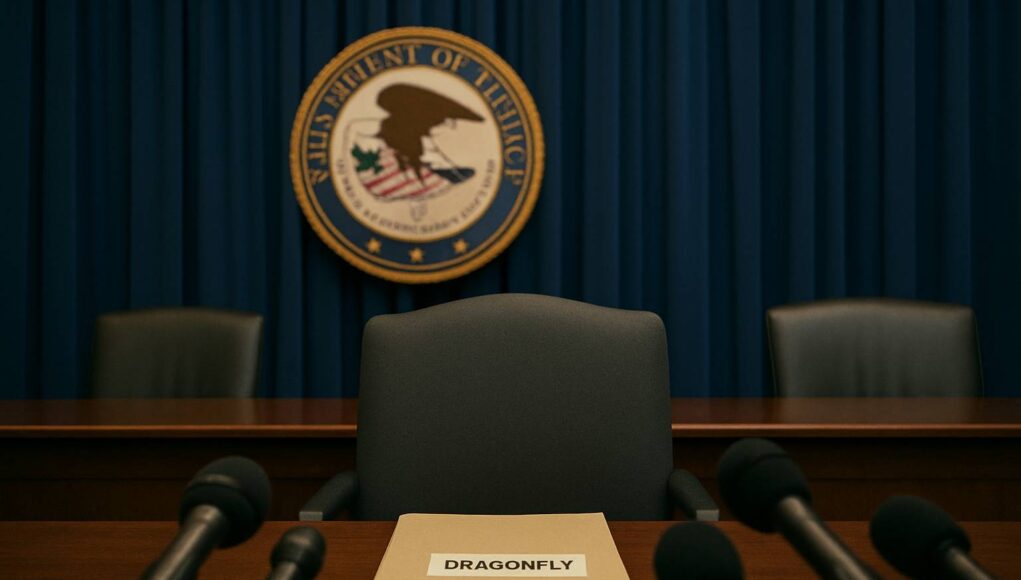After briefly landing in the crosshairs of media speculation, crypto venture firm Dragonfly has been cleared by the U.S. Department of Justice. The DOJ’s clarification, that it is not investigating Dragonfly, may close the chapter for the firm, but it opens a new one for the entire crypto VC sector. As fears of retroactive enforcement grow, so does scrutiny of past DeFi investments and the way media reports shape perception. The Dragonfly DOJ investigation story is now over, but its ripple effects are only beginning.
What Sparked the Rumors?
The controversy began in mid-July when several crypto media outlets reported that the DOJ was “considering” criminal charges against Dragonfly Capital employees. These reports connected the firm’s early investment in privacy protocol Tornado Cash to the DOJ crypto probe into money laundering and sanctions violations.
Though framed cautiously, the implication was clear: Dragonfly Capital charges could be forthcoming. The headlines circulated widely, despite relying on unnamed sources and offering no confirmation from official channels.
The DOJ Clarifies: No Target, No Charges
In court, federal prosecutors reportedly acknowledged that Dragonfly was not identified as a target or subject in any ongoing investigation. This was disclosed through court filings. No formal charges have been filed, and Dragonfly maintains it has received no contact or inquiry from law enforcement.
This directly contradicted the prevailing narrative. Dragonfly responded by reaffirming that law enforcement never reached out to the company, and they did not know of any pending action. The DOJ clarification neutralized the legal threat, but the reputational damage had already been done.
This episode underscores how quickly a Dragonfly DOJ investigation became a trending phrase, despite the absence of any actual probe.
Who Is Dragonfly?
Founded in 2018, Dragonfly Venture Capital is a crypto-native investment firm with global operations spanning the U.S. and Asia. It has backed leading protocols and platforms like Ethereum, StarkWare, dYdX, Bybit, and zkSync. Known for its early-stage bets and conviction in privacy tech, the firm also invested in Tornado Cash well before the U.S. Treasury sanctioned it in 2022. At the time the investment occurred, the Tornado Cash Dragonfly connection was entirely legal.
Dragonfly rebranded in 2023, dropping “Capital” from its name. It has since positioned itself as a cross-border powerhouse in Web3 innovation.
>>> Read more: Tornado Cash Sanctions Overturned: A Win for Decentralization
Reputational Fallout and Industry Shockwaves
Even though Dragonfly was not a DOJ target, the public narrative briefly treated it as such. For VCs in the space, this raised a chilling question: Is any past investment safe from reinterpretation under evolving crypto VC regulation?
Legal scholars and crypto insiders voiced concern over the idea of retroactive liability. The suggestion that a venture firm could face charges simply for investing in a protocol, especially before any legal prohibition, set off alarm bells. This episode highlighted the systemic DeFi investment risk tied to regulatory ambiguity.
What This Means for Crypto VC Firms
The DOJ may not have pursued Dragonfly, but the message landed anyway: The lines between legal, compliant investing and criminal exposure are getting blurrier.
In a regulatory climate where sanctions can be applied retroactively and developers charged for open-source code, VCs must now weigh:
- Jurisdictional exposure
- Future legal interpretations of DeFi activity
- Political risk associated with privacy tools
This adds a new layer of complexity to crypto venture firm scrutiny. It goes beyond smart contract audits and tokenomics.
Lessons Learned: Regulation, Risk, and Reporting
The biggest takeaway? Reputational damage doesn’t require actual guilt, only a suggestive headline. Dragonfly’s experience is a case study in how crypto media accountability and regulatory ambiguity can create a perfect storm.
Meanwhile, the Roman Storm Tornado Cash trial continues, keeping privacy protocols and their investors in the regulatory spotlight. Whether this leads to formal frameworks or further enforcement-first chaos, remains to be seen.
For now, the Dragonfly DOJ investigation is over. However, the scrutiny it unleashed on crypto venture firms is very much alive.
Readers’ frequently asked questions
What does it mean to be a “target” in a DOJ investigation?
In DOJ terminology, a “target” is a person or entity the government believes has substantial evidence against them and is likely to face charges. This is different from being a “subject,” who may be involved or have relevant information, but is not necessarily accused of wrongdoing.
What is Tornado Cash, and why did the U.S. Treasury sanction it?
Tornado Cash is a decentralized crypto mixer protocol that obfuscates transaction histories on the Ethereum blockchain. The U.S. Treasury sanctioned the protocol in August 2022 for allegedly facilitating the laundering of billions in illicit funds, including assets tied to North Korean hackers.
What is the role of the Roman Storm trial in the broader Tornado Cash legal context?
Roman Storm, co-founder of Tornado Cash, is currently facing U.S. federal charges related to money laundering, sanctions violations, and operating an unlicensed money transmitting business. His trial is a central legal test for how the U.S. applies financial crime laws to open-source protocol developers.
What Is In It For You? Action items you might want to consider
Review VC portfolio exposure to regulatory risk
Crypto investors and fund managers should assess whether any current or past investments are linked to protocols now facing sanctions or enforcement actions, particularly in the DeFi and privacy sectors.
Monitor developments in the Roman Storm trial
The outcome of the Tornado Cash co-founder’s case may influence future liability standards for developers, investors, and DAO contributors. Legal professionals and compliance teams should track proceedings closely.
Evaluate due diligence standards for DeFi investments
VCs active in early-stage crypto rounds should ensure their due diligence processes include legal and jurisdictional risk assessments, particularly for projects that operate without centralized control or compliance frameworks.










